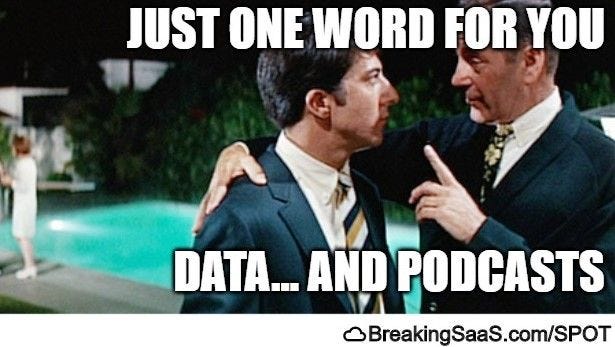Data & Podcasts with Paul Vogel
If you believe in the strategy, and you believe in what we're going to do, and what we're trying to create, then just stick with us because it's going to be really successful and the company is going to be a lot bigger and worth a lot more.
Paul Vogel (Spotify CFO) sat down (Zoom'd?) August 27th with Ben Swinburne (Morgan Stanley's Media analyst) to discuss all things podcasts, international growth, margins, and obviously Paul's "Desert Island" album choice - Born to Run.
Operations are normalizing post-Covid shock
Spotify has always operated a very distributed workforce so the company's early move to full-remote was handled well, with productivity about where it was before.
Usage trends fell in the early months of Covid, but have now mostly normalized. In-car listening has stabilized at ~10% below prior peaks after falling 50% in March/April. Offsetting these declines is strength from in-home speakers and game counsels, but the company is waiting to see how trends normalize in 12-18 months.
Margins are on our Minds
Unique to the music industry is Spotify's (and all streaming services) requirement to pay a large portion of their revenues to rights holders (record labels & artists). Since the company's direct listing in April 2018 this has been a big concern for investors.
Streaming services have minimal leverage here...
Building proprietary content (bands & songs) is much harder than Netflix whipping up a new food documentary every week
Streaming is still just a small percentage of a band's income so it doesn't make sense (yet?) to work with Spotify directly (bands need the labels to help book tours, etc.)
If one service (Spotify) doesn't want to play ball, labels can just pull their content and move it to another provider (Apple, Amazon, Google, etc).
... But that could change with Data... Spotify wants to use it's massive data, technology, and AI/ML capabilities to partner with labels and creators to help them become smarter and maximize their businesses and revenue. Thesis: Spotify's tools = proprietary value = more $$$. Will they pay? TBD.
... and Podcasts. The company is making big investments into podcasts, and actively modeling out the impact to revenue, costs, subscribers and churn. Spotify sees a long-term opportunity to expand Gimlet, Ringer and Parcast internationally.
The People Want Spotify
Spotify launched in Russia and 12 other European countries most Americans couldn't point to on a map mid-July. The Russian launch was better than expected and outperformed the company's recent launch in India. Overall, it represents a big signal for pent-up demand and how excited consumers are to have access to the service.
Started at the bottom, now we're... at ~300mm users. The company has 3 primary growth drivers going forward: 1) Expand into new markets, 2) develop unique, differentiated products, and 3) build out its localized content library (music and podcasts).
At the end of the day, there are billions and billions of smart phones and there's no reason why every smartphone out there should not have a streaming audio service - and our view is it should be Spotify.
Are you thinking what I'm thinking? Eric Schmidt's vision for Google was always to deliver precisely one result for every search query. While that is obviously hella difficult, data allows the company to offer a highly customized user experience, presenting more and more songs you love and fewer you want to skip.
FWIW - Paul's eating his own cooking. He admitted he has now become a country music fan (against his expectation) based on the app's recommendations. Yee Haw, Paul! I'd highly recommend looping in some Eric Church and Keith Anderson.
Important to Play the Market Share Game
Growth > profitability. The company is still in it's early days of user growth, subscriber growth, new market growth, and product growth. They're playing a market share game so running the company at break-even is part of the game plan.
Yes, they could manage the business to show income statement profitability, but then they would not be able to invest as heavily. The company is also FCF positive, allowing them to invest in capturing valuable LTV/SAC subscribers.
Feel really good that that we're adding users and subscribers that will add long-term value to Spotify. Our LTV/SAC has been hovering around 2.5 to 3 times.
CEO Daniel Ek is playing the game to win over the next 5-15 years. Few leaders can balance short-term tactical decisions, with long-term strategic options - Daniel is exceptional at both.
If you believe in the strategy, and you believe in what we're going to do, and what we're trying to create, then just stick with us because it's going to be really successful and the company is going to be a lot bigger and worth a lot more.

